|
|
|
Sort Order |
|
|
|
Items / Page
|
|
|
|
|
|
|
| Srl | Item |
| 1 |
ID:
092521
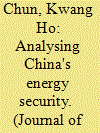

|
|
|
| 2 |
ID:
091571


|
|
|
|
|
| Publication |
2009.
|
| Summary/Abstract |
Crude oil is a limited natural resource subject to depletion and several reports indicate that the world's crude oil production is close to the maximum level and that it will start to decrease after reaching this maximum. A post-Kyoto political agenda to reduce oil consumption will have the same effect on aviation fuel production as a natural decline in the crude oil production. On the other hand, it is predicted by the aviation industry that aviation traffic will keep on increasing.
|
|
|
|
|
|
|
|
|
|
|
|
|
|
|
|
| 3 |
ID:
138557
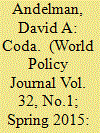

|
|
|
|
|
| Summary/Abstract |
Pull up to a gas pump anywhere in Saudi Arabia, and you can fill your tank for 45 cents a gallon. The price hasn’t changed since the King dropped it from 90 cents in 2006. It’s the King who sets the price because the number has little or nothing to do with the price of oil on the world markets. It has more to do with how much it costs to lift each gallon out of the ground and refine it. Because, after all, the Kingdom owns it all.
|
|
|
|
|
|
|
|
|
|
|
|
|
|
|
|
| 4 |
ID:
128346


|
|
|
|
|
| Publication |
2014.
|
| Summary/Abstract |
This paper discusses the criticisms of the IEA World Energy Outlook raised by Aleklett et al. (2010), often referred to as the 'Uppsala critique'. The major argument of Aleklett et al. is that the rates of depletion, the ratio of annual production to remaining resources or reserves, assumed by the IEA in certain categories of fields are unreasonable. In this paper, we call into question the reductions in future global oil production that Aleklett et al. argue are necessary: they have incorrectly applied a depletion rate for all fields within a region to different subsets of fields within a region. The more minor reductions to future global oil production that Aleklett et al. argue are needed because of the IEA modelling of the production of bitumen and natural gas liquids are also examined briefly.
|
|
|
|
|
|
|
|
|
|
|
|
|
|
|
|
| 5 |
ID:
150377
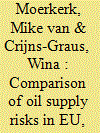

|
|
|
|
|
| Summary/Abstract |
For many countries, the inflow of energy is essential to keep economies running. Oil is typically considered to be the most critical fuel as an input for the petro-chemical and transportation sector and due to limited and less spread reserves. In this study external oil supply risks are assessed for the period up to 2035 for the European Union, United States, China, Japan and India (being the five largest importers of oil in the world), based on their current supplier portfolio. Scenarios are constructed for several climate policy and oil-supply projections.
It is found that risks increase strongly, when stringent climate policies are prevented from being implemented, especially when a peak in oil supply is taken into account, resulting in major oil supply-disruptions. China faces the lowest oil supply risks in most scenarios but the trends of India, China and US converge over time due to increasing import dependency of China and India. Japan faces high risks since the country has the highest oil import dependency combined with a low oil import diversification. For the EU, all figures are strongly influenced by Russia, accounting for 32% of total imports, and to a lesser extent Norway (11%), with high overall risks.
|
|
|
|
|
|
|
|
|
|
|
|
|
|
|
|
| 6 |
ID:
115183


|
|
|
|
|
| Publication |
2012.
|
| Summary/Abstract |
Assuming that global oil production peaked, this paper uses scenario analysis to show the economic effects of a possible supply shortage and corresponding rise in oil prices in the next decade on different sectors in Germany and other major economies such as the US, Japan, China, the OPEC or Russia. Due to the price-inelasticity of oil demand the supply shortage leads to a sharp increase in oil prices in the second scenario, with high effects on GDP comparable to the magnitude of the global financial crises in 2008/09. Oil exporting countries benefit from high oil prices, whereas oil importing countries are negatively affected. Generally, the effects in the third scenario are significantly smaller than in the second, showing that energy efficiency measures and the switch to renewable energy sources decreases the countries' dependence on oil imports and hence reduces their vulnerability to oil price shocks on the world market.
|
|
|
|
|
|
|
|
|
|
|
|
|
|
|
|
| 7 |
ID:
111392


|
|
|
|
|
| Publication |
2012.
|
| Summary/Abstract |
There is a lively debate between 'concerned' and 'unconcerned' analysts regarding the future availability and affordability of oil. We critically examine two interrelated and seemingly plausible arguments for an unconcerned view: (1) there is a growing amount of remaining reserves; (2) there is a large amount of oil with a relatively low average production cost. These statements are unconvincing on both theoretical and empirical grounds. Oil availability is about flows rather than stocks, and average cost is not relevant in the determination of price and output. We subsequently implement a bottom-up model of regional oil production with micro-foundations in both natural science and economics. An oil producer optimizes net present value under the constraints of reservoir dynamics, technological capacity and economic circumstances. Optimal production profiles for different reservoir drives and economic scenarios are derived. The field model is then combined with a discovery model of random sampling from a lognormal field size-frequency distribution. Regional discovery and production scenarios are generated. Our approach does not rely on the simple assumptions of top-down models such as the Hubbert curve - however it leads to the same qualitative result that production peaks when a substantial fraction of the recoverable resource remains in-ground.
|
|
|
|
|
|
|
|
|
|
|
|
|
|
|
|
| 8 |
ID:
126815
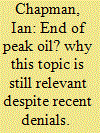

|
|
|
|
|
| Publication |
2014.
|
| Summary/Abstract |
Up until recently Peak Oil was a major discussion point crossing from academic research into mainstream journalism, yet it now attracts far less interest. This paper evaluates the reasons for this and on-going relevance of Peak Oil, considering variations in predictive dates for the phenomenon supported by technological, economic and political issues. Using data from agencies, the validity of each position is assessed looking at reserves, industrial developments and alternative fuels. The complicating issue of demand is also considered.
The conclusions are that, supported by commercial interests, an unsubstantiated belief in market and technical solutions, and a narrow paradigmatic focus, critics of Peak Oil theory have used unreliable reserve data, optimistic assumptions about utilisation of unconventional supplies and unrealistic predictions for alternative energy production to discredit the evidence that the resource-limited peak in the world's production of conventional oil has arrived, diverting discussion from what should be a serious topic for energy policy: how we respond to decreasing supplies of one of our most important energy sources.
|
|
|
|
|
|
|
|
|
|
|
|
|
|
|
|
| 9 |
ID:
116812


|
|
|
|
|
| Publication |
2012.
|
| Summary/Abstract |
Since the availability of cheap and suitable energy underpins in many ways both developed and developing economies, it is crucial that national economies are prepared for potential energy shocks. Shocks may arise from physical constraints, such as a peak in the national and global production rate of oil, or from institutional constraints, such as economic incentives to reduce greenhouse gas emissions. This article reviews the potential and implications of alternative energy technologies intended to avoid or alleviate such shocks. It is suggested that system-wide analysis is required to properly assess all alternatives.
|
|
|
|
|
|
|
|
|
|
|
|
|
|
|
|
| 10 |
ID:
103454
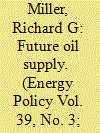

|
|
|
|
|
| Publication |
2011.
|
| Summary/Abstract |
The IEA was established in 1974 with a mandate to promote energy security amongst its members, namely the states of the OECD, and to advise those members on sound energy policy. Its recent forecasts of the medium and long term prospects for oil supply, however, have wavered, alternating from optimistic to pessimistic and back again. For policy-makers, such inconsistency is difficult to deal with. Firstly we examine whether the changing outlooks seen in IEA forecasts made between 2007 and 2010 truly reflect a demonstrable, underlying change in the known facts, and we can find no such factual changes reported by the IEA. Secondly we examine whether the serious criticisms of the IEA's (2008) forecast made by other analysts have yet been addressed, and we conclude that they have not. Thirdly we consider the possible effects of the current economic downturn upon the IEA's assumptions and upon future oil supply. We conclude that all the forecasts made by the IEA appear to be too optimistic throughout this period.
|
|
|
|
|
|
|
|
|
|
|
|
|
|
|
|
| 11 |
ID:
169837
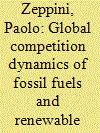

|
|
|
|
|
| Summary/Abstract |
We develop a stochastic decision model to analyse the global competitive dynamics of fossil fuels and renewable energy. It describes coal, oil/gas, solar and wind. These differ not only in pollution intensities but also in profitability and innovation potential. The model accounts for the effect of learning curves, path-dependence and climate policies. Adoption shares endogenously affect agents' utility through increasing returns to adoption, learning, and a ‘peak oil’ capacity constraint. We find that peak oil induces a transition to coal rather than renewable energy, which worsens climate change. By introducing climate policies - such as a carbon tax, market adoption or subsidies for renewables, and eliminating existing subsidies for fossil fuels - we identify potential transition patterns to a low-carbon energy system. Model analysis clarifies two main features of climate policies: which ones solve the climate problem, i.e. do not surpass the critical carbon budget; and how uncertain or variable are final market shares of energy sources.
|
|
|
|
|
|
|
|
|
|
|
|
|
|
|
|
| 12 |
ID:
097436


|
|
|
|
|
| Publication |
2010.
|
| Summary/Abstract |
Peak oil theory predicts that oil production will soon start a terminal decline. Most authors imply that no adequate alternate resource and technology will be available to replace oil as the backbone resource of industrial society. This article uses historical cases from countries that have gone through a similar experience as the best available analytical strategy to understand what will happen if the predictions of peak oil theorists are right. The author is not committed to a particular version of peak oil theory, but deems the issue important enough to explore how various parts of the world should be expected to react. From the historical record he is able to identify predatory militarism, totalitarian retrenchment, and socioeconomic adaptation as three possible trajectories.
|
|
|
|
|
|
|
|
|
|
|
|
|
|
|
|
| 13 |
ID:
098629


|
|
|
|
|
| Publication |
2010.
|
| Summary/Abstract |
Within the polarised and contentious debate over future oil supply a growing number of commentators are forecasting a near term peak and subsequent decline in production. But although liquid fuels form the foundation of modern industrial economies, the growing debate on 'peak oil' has relatively little influence on energy and climate policy. With this in mind, the UK Energy Research Centre (UKERC) has conducted an independent, thorough and systematic review of the evidence, with the aim of establishing the current state of knowledge, identifying key uncertainties and improving consensus. The study focuses upon the physical depletion of conventional oil in the period to 2030 and includes an in-depth literature review, analysis of industry databases and a detailed comparison of global supply forecasts. This Communication summarises the main findings of the UKERC study. A key conclusion is that a peak of conventional oil production before 2030 appears likely and there is a significant risk of a peak before 2020.
|
|
|
|
|
|
|
|
|
|
|
|
|
|
|
|
| 14 |
ID:
110726


|
|
|
|
|
| Publication |
2011.
|
| Summary/Abstract |
The Deepwater Horizon incident demonstrated that most of the oil left is deep offshore or in other difficult to reach locations. Moreover, obtaining the oil remaining in currently producing reservoirs requires additional equipment and technology that comes at a higher price in both capital and energy. In this regard, the physical limitations on producing the ever-increasing quantities of oil are highlighted as well as the possibility of the peak of production occurring this decade. The economics of oil supply and demand are also briefly discussed showing why the available supply is basically fixed in the short to medium term. Also, an alarm bell for economic recessions is shown to be when energy takes a disproportionate amount of total consumer expenditures. In this context, risk mitigation practices in government and business are called for. As for the former, early education of the citizenry of the risk of economic contraction is a prudent policy to minimize potential future social discord. As for the latter, all business operations should be examined with the aim of building in resilience and preparing for a scenario in which capital and energy are much more expensive than in the business-as-usual one.
|
|
|
|
|
|
|
|
|
|
|
|
|
|
|
|
| 15 |
ID:
092811


|
|
|
|
|
| Publication |
2009.
|
| Summary/Abstract |
According to the long-term scenarios of the International Energy Agency (IEA) and the US Energy Information Administration (EIA), conventional oil production is expected to grow until at least 2030. EIA has published results from a resource-constrained production model which ostensibly supports such a scenario. The model is here described and analyzed in detail. However, it is shown that the model, although sound in principle, has been misapplied due to a confusion of resource categories. A correction of this methodological error reveals that EIA's scenario requires rather extreme and implausible assumptions regarding future global decline rates. This result puts into question the basis for the conclusion that global "peak oil" would not occur before 2030.
|
|
|
|
|
|
|
|
|
|
|
|
|
|
|
|
| 16 |
ID:
088041
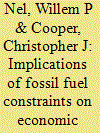

|
|
|
|
|
| Publication |
2009.
|
| Summary/Abstract |
Best estimates of future energy availability are derived as an Energy Reference Case (ERC). An explicit economic growth model is used to interpret the impact of the ERC on economic growth. The model predicts a divergence from 20th century equilibrium conditions in economic growth and socio-economic welfare is only stabilised under optimistic assumptions that demands a paradigm shift in contemporary economic thought and focused attention from policy makers.
Fossil fuel depletion also constrains the maximum extent of Global Warming. Carbon emissions from the ERC comply nominally with the B1 scenario, which is the lowest emissions case considered by the IPCC. The IPCC predicts a temperature response within acceptance limits of the Global Warming debate for the B1 scenario. The carbon feedback cycle, used in the IPCC models, is shown as invalid for low-emissions scenarios and an alternative carbon cycle reduces the temperature response for the ERC considerably compared to the IPCC predictions.
Our analysis proposes that the extent of Global Warming may be acceptable and preferable compared to the socio-economic consequences of not exploiting fossil fuel reserves to their full technical potential.
|
|
|
|
|
|
|
|
|
|
|
|
|
|
|
|
| 17 |
ID:
107933


|
|
|
|
|
| Publication |
2011.
|
| Summary/Abstract |
The twenty-first century heralds the unprecedented acceleration and convergence of multiple, interconnected global crises - climate change, energy depletion, food scarcity, and economic instability. While the structure of global economic activity is driving the unsustainable depletion of hydrocarbon and other natural resources, this is simultaneously escalating greenhouse gas emissions resulting in global warming. Both global warming and energy shocks are impacting detrimentally on global industrial food production, as well as on global financial and economic instability. Conventional policy responses toward the intensification of these crises have been decidedly inadequate because scholars and practitioners largely view them as separate processes. Yet increasing evidence shows they are deeply interwoven manifestations of a global political economy that has breached the limits of the wider environmental and natural resource systems in which it is embedded. In this context, orthodox IR's flawed diagnoses of global crises lead inexorably to their 'securitisation', reifying the militarisation of policy responses, and naturalising the proliferation of violent conflicts. Global ecological, energy and economic crises are thus directly linked to the 'Otherisation' of social groups and problematisation of strategic regions considered pivotal for the global political economy. Yet this relationship between global crises and conflict is not necessary or essential, but a function of a wider epistemological failure to holistically interrogate their structural and systemic causes.
|
|
|
|
|
|
|
|
|
|
|
|
|
|
|
|
| 18 |
ID:
088210


|
|
|
|
|
| Publication |
2009.
|
| Summary/Abstract |
Peak oil research and the Association for the Study of Peak Oil and Gas (ASPO) have contributed a great deal to improve people's recognition of peak oil. Although peak oil is becoming a part of public recognition, it is still hard to say whether peak oil discussion will develop into a theory such as "peakoilism". On one hand, there are still some difficult problems in peak oil research. On the other hand, the peakoilers have the potential for scientific research and have their allies: the climate change researchers and the new energy advocates. Oil is a limited, non-renewable resource, and an oil peak is inevitable. Peak oil theory is a kind of development theory rather than a crisis theory, which promotes reasonable utilization of the limited oil resources, promotes conservation, and encourages the development of renewable energy.
|
|
|
|
|
|
|
|
|
|
|
|
|
|
|
|
| 19 |
ID:
116977


|
|
|
|
|
| Publication |
2012.
|
| Summary/Abstract |
Debates about the possibility of a near-term maximum in world oil production have become increasingly prominent over the past decade, with the focus often being on the quantification of geologically available and technologically recoverable amounts of oil in the ground. Economically, the important parameter is not a physical limit to resources in the ground, but whether market price signals and costs of extraction will indicate the efficiency of extracting conventional or nonconventional resources as opposed to making substitutions over time for other fuels and technologies. We present a hybrid approach to the peak-oil question with two models in which the use of logistic curves for cumulative production are supplemented with data on projected extraction costs and historical rates of capacity increase. While not denying the presence of large quantities of oil in the ground, even with foresight, rates of production of new nonconventional resources are unlikely to be sufficient to make up for declines in availability of conventional oil. Furthermore we show how the logistic-curve approach helps to naturally explain high oil prices even when there are significant quantities of low-cost oil yet to be extracted.
|
|
|
|
|
|
|
|
|
|
|
|
|
|
|
|
| 20 |
ID:
150875


|
|
|
|
|
| Summary/Abstract |
Resilience has become a prominent concept to understand system vulnerabilities and flexible ways of adapting to crises. Recently, it gained importance in discussions about the possible peak in oil production (peak oil) and its consequences, which might affect economic performance, social well-being and political stability, and thus also the energy transition to a low-carbon economy. The paper presents a new way of measuring resilience as absolute resilience related to a best practice-model of a resilient society. The resilience model is grounded in explicit theoretical assumptions. All indicators are justified by theoretical and empirical arguments. We present a case study of Austrian municipalities and broader-scale spatial types, which were defined according to their degree of urbanization. The mean resilience of Austrian municipalities is moderate, the difference between resilience values of municipalities is small. Significant differences between spatial types exist. Higher resilience is displayed by less urbanized types due to a higher share of agricultural activities and a more favorable level of GDP per capita. Austria has considerable latitude to improve resilience. Corresponding policies should target resilience components with the lowest values first. A sole focus on regionalization is not recommended. These conclusions are applicable to OECD countries in general.
|
|
|
|
|
|
|
|
|
|
|
|
|
|
|
|
|
|
|
|
|